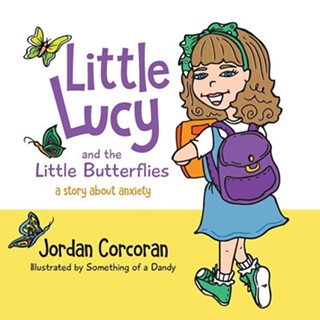Jordan Corcoran feels she would have sought help for her generalized anxiety disorder and panic disorder much sooner if there wasn’t such a huge stigma around mental health. That's why the Pittsburgh author is self-publishing a children’s book, Little Lucy and the Little Butterflies, on Aug. 8 in hopes of creating a more accepting world around mental health.
“There are so many kids, especially right now, that are struggling with their mental health and they don’t know what it is,” says Corcoran. “Little Lucy is a fun, informal, bright way to start bringing up the idea of mental health without these medical terms that might be intimidating.”
Corcoran was diagnosed with generalized anxiety disorder and panic disorder almost 15 years ago, during her freshman year of high school. For two years leading up to that diagnosis, Corcoran struggled. She didn’t know what was going on, and she was being bullied at school.
“[T]he stigma surrounding mental health was so strong, that the idea of something being wrong with me mentally was humiliating,” says Corcoran. So she refused to get help, and when she went to college things got worse. Corcoran was in and out of the hospital, taking ambulance rides with an oxygen mask strapped to her face.
Eventually, Corcoran found writing as a creative and emotional outlet. While she struggled to express herself in person, with writing she was able to explain her feelings in a much clearer, healthier way. In response, Corcoran founded Listen, Lucy about seven years ago. The mental health organization has the goal of ending the stigma around mental health.
Originally, Listen, Lucy was an anonymous online outlet where people could share their stories without fear of judgment while using writing as a coping technique. Visitors to listenlucy.org can still do that, but the organization evolved to include Corcoran speaking at middle schools, high schools, and colleges, as well as mental health organizations.
The idea for Little Lucy came about three years ago, and Corcoran started writing the story before her second book, Write It Out, was released in 2017. Write It Out is an “interactive journal with 40 prompts that will get your mind to work and your soul to heal.” Listen, Lucy, her first book, came out in 2015 and included a collection of anonymous stories that were submitted to listenlucy.org.
“It never felt like it was the right time [for Little Lucy], but I always kept coming back to it,” says Corcoran. “Then last summer, one year ago, I gave birth to my son and became a mom. All of a sudden Little Lucy started popping up in my brain a lot more.”
Just before the pandemic shutdowns began in March, Corcoran told her editor she wanted to revisit Little Lucy. She started rewriting, and when quarantine happened, Corcoran made the book her priority.
In Little Lucy, a young girl named Lucy learns about 4-7-8 breathing, a technique that involves breathing in for four seconds, holding the breath for seven seconds, and then exhaling for eight seconds. Corcoran has used this breathing plan for over a decade. Lucy also learns a few other options for dealing with the “little butterflies in her stomach,” in case the breathing plan doesn't work.
“I think when parents hear words like mental illness or anxiety or coping mechanisms or medication, all of that sounds so official and overwhelming,” says Corcoran. “So that’s why with Little Lucy, we wanted to focus on the ideas of little butterflies, because you don’t have to have a mental illness diagnosis to care about mental health, we [have] all felt butterflies in our stomach."
The book's illustrations are done by Ashleigh Long, owner of Chicago-based graphic company, Something of a Dandy. Long was given photos of Corcoran as a child to use as inspiration.
“I think the most important thing with Little Lucy is that there isn’t any reason to be afraid or to be imitated to be talking about these things with your kids,” says Corcoran. “From the jump, we talk to our kids about physical health, eating right and exercising, and taking care of ourselves and personal hygiene. All of that is so important but mental health needs to be on that list too."



